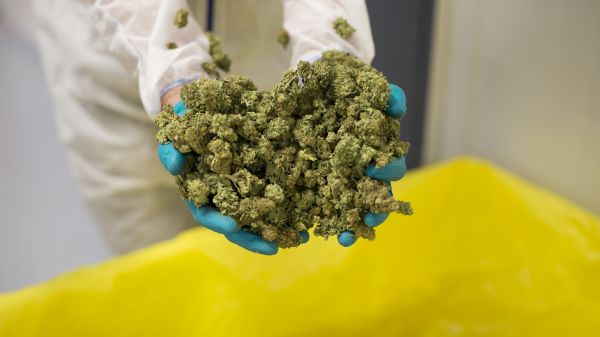
Marijuana could be the real winner in upcoming midterm elections.
Cowen’s Washington Research Group looked into a few potential outcomes for November and found that regardless of the political party in power, midterms will “deliver incremental catalysts” for the pot landscape.
“Few industries are better positioned than cannabis regardless of outcome,” Cowen senior analyst Vivien Azer wrote in a note to clients this week. “Generally speaking, the higher the Blue Wave, the better for the budding industry though even a potential Red Wave is likely to feature pockets of good news.”
Weed stocks have caught the attention of Wall Street in recent weeks. Canadian marijuana producer Tilray rose 40 percent Wednesday and is set to add to a 400 percent increase over the last month. Producers Canopy Growth and GW Pharmaceuticals rallied 7 percent and 3 percent, respectively, on Wednesday. Tilray posted its second-best day ever on Tuesday after announcing approval from the Drug Enforcement Administration to import pot to the United States for medical research.
Cowen covers Tilray, with a $62 price target and a “Buy” rating on the stock. The firm also recommends clients buy Canopy Growth Corporation, KushCo, Constellation Brands and Imperial Brands.
The main roadblock now, as Azer sees it, is Attorney General Jeff Sessions, who has said that “good people don’t smoke marijuana” and is vehemently against legalization.
“It is hard to imagine his replacement being more hostile to cannabis,” Azer said. If Sessions is replaced, he said, the new attorney general will “continue to play offense in Colorado, which could pay cannabis dividends.”
President Donald Trump’s increasing criticism of Sessions raises the likelihood he could be fired or exit after the elections. “I don’t have an Attorney General. It’s very sad,” Trump told the Hill.TV on Tuesday.
Blue wave or red wave
The best-case scenario for cannabis would be a total blue wave, Azer said. It’s also possible the House flips to a Democratic majority and the Senate holds, meaning blue-state lawmakers would likely just focus on moving pro-cannabis bills out of the House. If nothing else, a Democrat-controlled House would help shore up blue-state finances, which lost certain state and local tax deductions in the GOP tax bill, Azer said.
If the blue wave fizzles and Republicans keep a majority throughout Congress, cannabis will likely remain status quo with a potential boost from the removal of Sessions.
State races are also key for the future of marijuana and the high-flying stocks. Gubernatorial races in Florida, Connecticut, New Hampshire, Rhode Island, New York and Illinois have the potential to swing blue. If both adult use measures pass in those states, total use could expand to roughly 43 percent of the population, accounting for 47 percent of GDP, Azer said.
Michigan and North Dakota are both voting on adult marijuana use ballot measures in November, while Utah and Missouri will vote on the legalization of medical cannabis. Should adult use access expand to 10 states, that would cover roughly 25 percent of the population and 28 percent of GDP, according to Cowen’s estimates.

